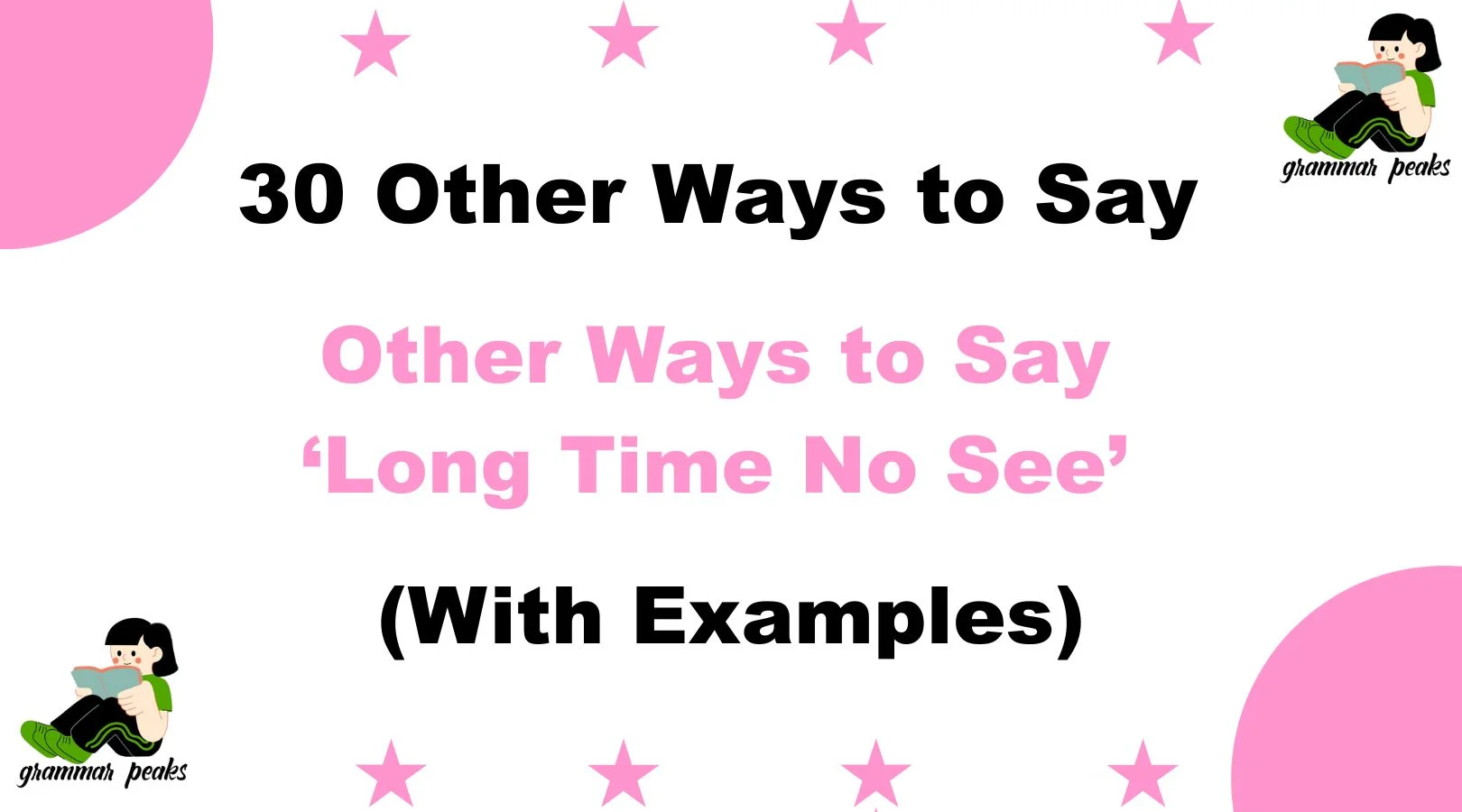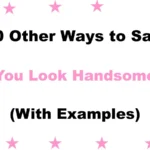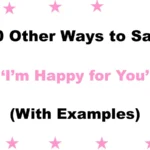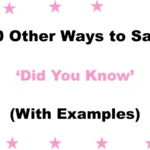Finding the right words to reconnect with someone after a while can truly make a difference. Saying “Long time no see“ is common, but sometimes it feels a bit too casual or overused. Choosing a warm, thoughtful alternative can make your message feel more personal and meaningful, showing genuine care and attention.
Whether you’re catching up with a friend, colleague, or family member, these 30 alternatives will help you express your feelings in a way that resonates deeply. Let’s explore these phrases together, so your next greeting feels fresh, heartfelt, and just right for any occasion.
What Does “Long Time No See” Mean?
“Long time no see” is a casual, friendly expression used when you haven’t seen someone in a while and want to acknowledge the time that’s passed since your last meeting. It’s often used as a warm greeting between friends, coworkers, or acquaintances when they reconnect after an extended absence.
Though the phrase is grammatically unusual, it has become a widely accepted idiom in English. At its heart, it’s a simple way of saying, “It’s been a while—I’m happy to see you again.”
When to Use “Long Time No See”
Use this phrase when you want to acknowledge a gap in meeting or communicating, mainly in informal and friendly contexts. It works well in casual conversations but is less suitable for professional emails or formal settings.
Is It Professional or Polite to Say “Long Time No See”?
While “Long time no see” is polite in informal situations, it’s usually not recommended in professional contexts because it sounds too casual and colloquial. For work or formal communication, choosing a more polished alternative will help maintain professionalism.
Pros and Cons of Saying “Long Time No See”
Pros:
- Instantly recognizable and friendly
- Creates a relaxed atmosphere
- Easy to use in casual talk
Cons:
- Can sound outdated or too informal
- May not fit professional or formal settings
- Lacks emotional warmth in some contexts
Synonyms for “Long Time No See”
- It’s been a while!
- Nice to see you again!
- It’s been too long!
- I haven’t seen you in ages!
- Great to catch up!
- It’s been forever!
- Look who it is!
- Fancy seeing you here!
- Long time, no chat!
- How have you been?
- It’s been ages since we last met!
- So good to see you!
- I’ve missed you!
- It’s been a minute!
- Been a while, hasn’t it?
- Glad to see you again!
- What a pleasant surprise!
- I was just thinking about you!
- It feels like forever!
- Where have you been hiding?
- It’s great running into you!
- We need to catch up!
- It’s so good to reconnect!
- I’ve been meaning to reach out!
- Time flies, doesn’t it?
- You’ve been on my mind!
- I’m so glad we bumped into each other!
- It’s wonderful to see you!
- What have you been up to?
- Feels like ages since we last spoke!
1. It’s been a while!
Definition: A casual phrase acknowledging that a significant amount of time has passed since the last meeting.
Detailed Explanation: This phrase shows you recognize the time gap but in a friendly, relaxed way.
Scenario Example: Running into a coworker at a café after months apart: “Hey, it’s been a while!”
Best Use: Informal to semi-formal situations.
Worst Use: Not ideal for very formal communication.
Tone: Warm and casual.
2. Nice to see you again!
Definition: A polite greeting that expresses happiness in seeing someone once more.
Detailed Explanation: This phrase conveys respect and friendliness, suitable in many contexts.
Scenario Example: Meeting a business partner at a conference: “Nice to see you again!”
Best Use: Formal and informal settings alike.
Worst Use: Very casual settings where more excitement is preferred.
Tone: Polite and warm.
3. It’s been too long!
Definition: Expresses that the time apart feels lengthy and is noticed.
Detailed Explanation: Shows eagerness to reconnect and implies missing the other person.
Scenario Example: Greeting a close friend at a party: “Wow, it’s been too long!”
Best Use: Close relationships or friends.
Worst Use: Too emotional for casual acquaintances.
Tone: Sincere and affectionate.
4. I haven’t seen you in ages!
Definition: A playful, informal way to say a long time has passed.
Detailed Explanation: Implies surprise and happiness at meeting again.
Scenario Example: Spotting an old classmate on the street: “I haven’t seen you in ages!”
Best Use: Informal and friendly.
Worst Use: Professional settings.
Tone: Lighthearted and warm.
5. Great to catch up!
Definition: Expresses pleasure in reconnecting and sharing updates.
Detailed Explanation: Often used after or during a conversation, emphasizing the joy of reconnecting.
Scenario Example: After a coffee meeting: “It’s great to catch up!”
Best Use: Both casual and professional settings.
Worst Use: Not suitable for quick greetings without conversation.
Tone: Friendly and enthusiastic.
6. It’s been forever!
Definition: Emphasizes a very long gap in meeting someone.
Detailed Explanation: Conveys a bit of exaggeration to stress the time passed.
Scenario Example: Meeting an old friend at a reunion: “It’s been forever!”
Best Use: Informal, among close friends.
Worst Use: Formal or professional.
Tone: Playful and warm.
7. Look who it is!
Definition: A cheerful, surprised greeting upon seeing someone unexpected.
Detailed Explanation: Shows excitement and delight in the encounter.
Scenario Example: Bumping into a colleague at the gym: “Look who it is!”
Best Use: Casual situations.
Worst Use: Formal or professional.
Tone: Playful and enthusiastic.
8. Fancy seeing you here!
Definition: A charming phrase expressing surprise at meeting someone in an unexpected place.
Detailed Explanation: Implies a casual and warm surprise.
Scenario Example: Meeting a neighbor at a bookstore: “Fancy seeing you here!”
Best Use: Casual or semi-formal.
Worst Use: Very formal settings.
Tone: Friendly and surprised.
9. Long time, no chat!
Definition: A variation of the original phrase emphasizing lack of recent conversation rather than just meeting.
Detailed Explanation: Focuses on the communication gap.
Scenario Example: Messaging a friend online after months: “Long time, no chat!”
Best Use: Informal communication.
Worst Use: Formal or professional.
Tone: Casual and friendly.
10. How have you been?
Definition: A warm, open-ended question inviting the other person to share updates.
Detailed Explanation: Focuses on the other person’s wellbeing after time apart.
Scenario Example: Meeting a former coworker: “Hey! How have you been?”
Best Use: All contexts, from informal to professional.
Worst Use: Not really a greeting replacement but a follow-up.
Tone: Empathetic and caring.
11. It’s been ages since we last met!
Definition: A slightly dramatic way to express that a long time has passed.
Detailed Explanation: This phrase emphasizes the length of time in a charming and relatable way.
Scenario Example: Reuniting with an old schoolmate: “It’s been ages since we last met!”
Best Use: Close friends or informal acquaintances.
Worst Use: Very formal contexts.
Tone: Nostalgic and warm.
12. So good to see you!
Definition: A heartfelt expression of joy in seeing someone again.
Detailed Explanation: Conveys sincerity and happiness without sounding overly emotional.
Scenario Example: Greeting a mentor at an event: “So good to see you!”
Best Use: Casual to semi-formal settings.
Worst Use: Might seem vague if used without context.
Tone: Genuine and friendly.
13. I’ve missed you!
Definition: An emotionally expressive way to show you’ve noticed someone’s absence.
Detailed Explanation: Adds a personal and sentimental touch to your greeting.
Scenario Example: Talking to a close friend after a long gap: “I’ve missed you!”
Best Use: Close relationships—friends, family, partners.
Worst Use: Professional or unfamiliar contacts.
Tone: Affectionate and heartfelt.
14. It’s been a minute!
Definition: A trendy, informal way of saying it’s been a while.
Detailed Explanation: Although it literally means a short time, in slang, it refers to a long gap.
Scenario Example: Texting a friend: “Hey! It’s been a minute!”
Best Use: Very casual and friendly conversations.
Worst Use: Any professional or formal setting.
Tone: Trendy and laid-back.
15. Been a while, hasn’t it?
Definition: A rhetorical question that reflects on the time passed since last meeting.
Detailed Explanation: Invites engagement and opens the door to conversation.
Scenario Example: Seeing a former colleague: “Been a while, hasn’t it?”
Best Use: Familiar but semi-professional settings.
Worst Use: Too vague for emotionally charged reunions.
Tone: Neutral and conversational.
16. Glad to see you again!
Definition: A warm way to welcome someone back into your life.
Detailed Explanation: Reflects polite warmth and respect, ideal for all ages.
Scenario Example: Reuniting at a networking event: “Glad to see you again!”
Best Use: Professional and polite greetings.
Worst Use: Too formal for playful or humorous catch-ups.
Tone: Courteous and warm.
17. What a pleasant surprise!
Definition: Conveys delight and unexpected joy in meeting someone.
Detailed Explanation: Ideal when the encounter is unplanned or spontaneous.
Scenario Example: Seeing an old friend in a different city: “What a pleasant surprise!”
Best Use: Informal and spontaneous meetings.
Worst Use: Planned meetings or formal introductions.
Tone: Cheerful and friendly.
18. I was just thinking about you!
Definition: Links the timing of the encounter to a meaningful coincidence.
Detailed Explanation: Adds warmth and emotional connection to the greeting.
Scenario Example: Meeting an old friend by chance: “I was just thinking about you!”
Best Use: Close friends or emotionally meaningful reunions.
Worst Use: Casual or superficial relationships.
Tone: Heartfelt and serendipitous.
19. It feels like forever!
Definition: An exaggerated way to emphasize the gap since the last interaction.
Detailed Explanation: Captures the emotional sense of a long absence.
Scenario Example: Reconnecting with a cousin at a wedding: “It feels like forever!”
Best Use: Close relationships.
Worst Use: Professional contexts.
Tone: Sentimental and lighthearted.
20. Where have you been hiding?
Definition: A playful phrase suggesting the person has been hard to find.
Detailed Explanation: Adds a fun, teasing tone to a reunion.
Scenario Example: Joking with a friend you haven’t seen: “Where have you been hiding?”
Best Use: Friends or casual acquaintances.
Worst Use: Professional settings.
Tone: Playful and informal.
21. It’s great running into you!
Definition: A spontaneous, warm response to an unplanned meeting.
Detailed Explanation: Shows joy and casual comfort in the encounter.
Scenario Example: Meeting an ex-coworker unexpectedly: “It’s great running into you!”
Best Use: Surprise meetups.
Worst Use: Planned or scheduled meetings.
Tone: Casual and genuine.
22. We need to catch up!
Definition: An invitation to reconnect and share updates.
Detailed Explanation: Signals interest in resuming the relationship or conversation.
Scenario Example: After a brief hello at a party: “We need to catch up soon!”
Best Use: Friends, colleagues, former classmates.
Worst Use: Distant or purely professional contacts.
Tone: Friendly and future-oriented.
23. It’s so good to reconnect!
Definition: Acknowledges the joy of renewing a connection.
Detailed Explanation: Conveys appreciation for re-establishing contact.
Scenario Example: Talking to someone after a long silence: “It’s so good to reconnect!”
Best Use: Emails, messages, or calls with past contacts.
Worst Use: Overly casual situations.
Tone: Warm and thoughtful.
24. I’ve been meaning to reach out!
Definition: Admits a delay in communication with an honest and caring tone.
Detailed Explanation: Adds a layer of sincerity, often appreciated in delayed greetings.
Scenario Example: Messaging a college friend: “I’ve been meaning to reach out!”
Best Use: Friends or people you regret losing touch with.
Worst Use: Unexpected face-to-face meetings.
Tone: Apologetic yet sincere.
25. Time flies, doesn’t it?
Definition: A reflective way to acknowledge the time passed.
Detailed Explanation: Encourages connection through shared amazement at how quickly time goes by.
Scenario Example: At a school reunion: “Wow—time flies, doesn’t it?”
Best Use: Reunions, memory-driven conversations.
Worst Use: Emotionally distant contacts.
Tone: Reflective and nostalgic.
26. You’ve been on my mind!
Definition: A gentle, caring phrase indicating the person has been remembered.
Detailed Explanation: Adds emotional warmth and shows you value the relationship.
Scenario Example: Calling a friend after a long gap: “You’ve been on my mind!”
Best Use: Friends, close connections, loved ones.
Worst Use: Professional or unfamiliar people.
Tone: Warm and emotionally sincere.
27. I’m so glad we bumped into each other!
Definition: Expresses gratitude for a chance encounter.
Detailed Explanation: Works beautifully when a meeting is unexpected but welcome.
Scenario Example: Running into a friend at a park: “I’m so glad we bumped into each other!”
Best Use: Unplanned meetings.
Worst Use: Formal reunions or scheduled events.
Tone: Cheerful and appreciative.
28. It’s wonderful to see you!
Definition: A more elevated and heartfelt version of “nice to see you.”
Detailed Explanation: Shows depth of feeling without being overly dramatic.
Scenario Example: Greeting a former mentor: “It’s wonderful to see you!”
Best Use: Professional and personal settings.
Worst Use: Too formal for everyday greetings.
Tone: Elegant and warm.
29. What have you been up to?
Definition: A friendly, open-ended way to invite the person to share updates.
Detailed Explanation: Signals interest in the person’s recent experiences.
Scenario Example: Meeting an old friend at a coffee shop: “What have you been up to?”
Best Use: Reconnecting conversations.
Worst Use: Not ideal for short greetings.
Tone: Engaging and friendly.
30. Feels like ages since we last spoke!
Definition: A casual, familiar phrase emphasizing the time apart.
Detailed Explanation: Adds a human, relatable touch that many people identify with.
Scenario Example: Messaging a friend after a long silence: “Feels like ages since we last spoke!”
Best Use: Texts, DMs, or informal messages.
Worst Use: Business communication.
Tone: Relatable and friendly.
Conclusion
Reaching out after time apart can feel awkward if we lean on tired phrases like “long time no see.” By choosing more thoughtful, expressive alternatives, we show that we truly value the connection. From playful and casual to professional and warm, each of these 30 alternatives brings its own flavor. Whether you’re reconnecting after days or decades, you’ll now have the perfect words to say “I care, I remember, and I’m glad we’re talking again.”
FAQs
1. Is it okay to still use “Long Time No See”?
Yes, but with care. While “Long Time No See” is widely understood and used casually, it’s worth noting that the phrase has debated origins that may be seen as insensitive in some cultural or historical contexts. It’s best used informally and among friends who won’t take offense. If you’re writing or speaking in a professional or inclusive setting, a warmer or more polished phrase might be better.
2. What’s the most professional alternative to “Long Time No See”?
Try: “It’s great to reconnect” or “Glad to see you again.” These phrases are respectful and appropriate for emails, meetings, and networking events. They express warmth without sounding too casual, making them perfect for professional settings.
3. How do I choose the best phrase for my situation?
Consider your tone, relationship, and context. If you’re texting a close friend, something like “It’s been a minute!” is perfect. But if you’re emailing a former boss, go with “I’ve been meaning to reach out” or “It’s wonderful to see you again.” The more personal the relationship, the more casual you can be.
4. Can these alternatives be used in writing, like emails or letters?
Absolutely. Many alternatives like “It’s been a while”, “I’ve missed you”, or “We need to catch up” translate beautifully to written communication. Just make sure the tone matches the platform—more polished for business, more relaxed for personal notes.
5. Why should I avoid overused phrases like “Long Time No See”?
Using overused or outdated phrases can make your message feel lazy or impersonal. Choosing a more specific or heartfelt greeting shows effort, which helps your message feel more genuine and builds better rapport with your audience—especially if you’re reconnecting after a long time.

Mariah Cannon is a dedicated Senior Content Specialist at GrammarPeaks, known for her clear, engaging writing and deep knowledge of English grammar and usage. With a background in linguistics and years of experience in content development, Mariah crafts informative and accessible articles that empower readers to master the nuances of the English language. Her work reflects a commitment to clarity, education, and helping others express themselves with confidence.





